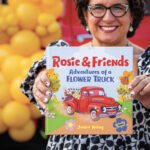
“I bark constantly. I poop on the floor. I don’t pay rent. Somehow, I still have a home.”
This statement recently appeared above a mug shot of my toy poodle. Although an attempt at humor, the image reveals the stress caused by the undesirable behavior of a dog. For owners who face more extreme circumstances, giving up their family pet may seem like the only viable option.
Andrew Hyle and Natahnee Shrawder recognized the stress an untrained dog can cause. They also realized that many people face financial situations that prevent them from seeking support or simply don’t know where get help.
Driven by a shared passion for animals, Hyle and Shrawder created Harrisburg’s Great Dog Program, an organization that provides in-home training, education and support to underserved and underrepresented populations completely free of charge.
Hyle founded the program in 2012, teaching free classes at the Allison Hill Community Center, and later, offering in-home support. Hyle said Shrawder, a former state dog warden, brought a much-needed business sense, helping to develop a long-term plan for growth.
“The Great Dog Program was existing, but when Natahnee got involved, it started living,” Hyle said.
Shrawder holds a degree in animal behavior but said her passion comes from her work with area shelters.
“In so many cases, a dog’s behavior is the result of some type of fallout from poor training methods or a lack of resources,” she said.
Science Based
The goal, Hyle said, is to help people who can’t afford training or who are frustrated and feel they are out of options. He also explained that underserved doesn’t always mean low income.
“I don’t care about a person’s monetary status, but I do care about keeping a dog safe and healthy at home,” he said.
He emphasized that a paid trainer should be a struggling owner’s first line of defense.
“We can help when people feel they have no where left to turn,” he said.
Hyle also said that low-income families should not be denied the opportunity to own a dog.
“What a dog does for a person’s life might mean more than their bank account,” he explained. “If an owner can provide food, we can help with everything else.”
Hyle and Shrawder both are certified through the International Association of Animal Behavior Consultants and have conducted numerous case studies on animal behavior and training. They said they are equipped to work with any breed.
“We have worked with biters to dogs with annoying behaviors,” Hyle said.
Shrawder noted they have never turned a dog away, estimating they helped close to 60 dogs over the past year in areas like Harrisburg, Mechanicsburg, Dillsburg and Carlisle.
Shrawder said their science-based approach emphasizes positive reinforcement.
“We treat each dog as an individual learner with unique needs,” she said.
Hyle added: “We apply the least invasive, minimally adverse approach that will work.”
Anyone seeking help must first complete a six-page client form.
“It helps weed out those who are simply looking to justify surrendering their dog,” Hyle explained. “We want to help people who are frustrated, can’t afford to pay for training, or don’t have the resources to know how to properly care for their dog.”
A three-hour, in-home visit follows, working with the dog and the family, offering pointers on positive training methods and suggestions for environmental changes to promote success. The level of support varies.
“Often, we will do follow up visits or calls if they’re needed,” Hyle said.
Shrawder said their Facebook page contains printable resources, including training tips and information on pet care. Visitors can also request in-home help.
A Voice
Despite support, owners may still surrender their dog, and Shrawder said they have an extensive network to assist. Alyx Robertson, who serves on the board of directors for Canine Rescue of PA, has worked with Hyle and Shrawder to re-home several dogs.
“They already know the dog, so they know what to look for when finding a new home,” she said, adding that Shrawder and Hyle often continue to work with the dog after it is placed. “They are great educators, filled with true and hard facts. They know what they’re doing.”
The program also supports area shelters. Laurie Lyon, adoption coordinator for Spiranza Animal Rescue, said unforeseen concerns sometimes arise after an adoption, and she refers Hyle and Shrawder.
“They go into the home, meet the dog where they are, and help get the dog and the owners to where they need to be for success,” Lyon said.
Hyle and Shrawder are still working to obtain nonprofit status so they can apply for grants and accept the monetary donations needed to expand. Hyle said leashes, crates and other pet equipment have been donated, but all operating costs are out-of-pocket. Long-term plans include increasing community education and supporting more families.
“I am not here for the money,” Hyle said. “I just want to help as much as I can.”
Shrawder agreed.
“I’m feeling more fulfilled than I’ve felt in a long time,” she said.
Lyon emphasized that so much can be prevented with proper training, education and resources.
“We are a voice for the voiceless,” she said. “And the Great Dog Program is a key component of that.”
For more information, email greatdogprogram@gmail.com or visit the Facebook page: Harrisburg’s Great Dog Program.





